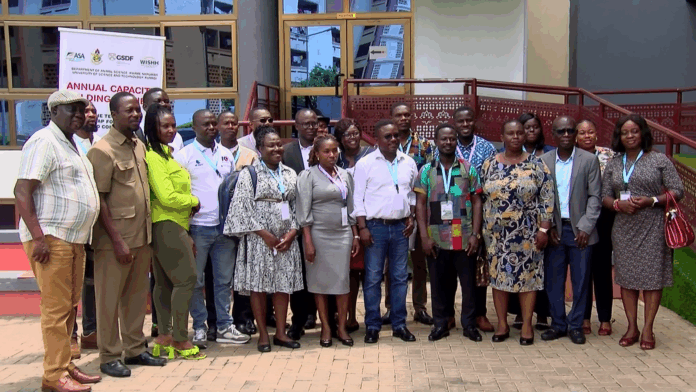The Ghana National Poultry Farmers Association is gravely concerned over the government’s failure to engage leadership of the association over the implementation of its flagship ‘Nkoko Nkitinkiti’ poultry initiative.
The groundbreaking project aims to reduce Ghana’s reliance on imported poultry products with over 55,000 households expected to be roped into poultry production.
As the project is set for roll-out this month, the poultry farmers say efforts to hold meetings with the government on modalities for the project have failed.
Western Regional Vice Chairperson of the poultry farmers association, Francis Nsiah, is not enthused about the Food and Agriculture Ministry’s non-engagement.
Speaking on the sidelines of a five-day capacity-building workshop in the poultry sector, he urged the ministry to reconsider its strategy and adopt a more inclusive approach.
“We are the mother association of poultry farmers in the country, yet the government, through the Ministry of Food and Agriculture, has failed to consult or involve us in discussions regarding the implementation plan and the selection of poultry farmers to scale up production,” he said.
The association believes their involvement would enhance the credibility, transparency, and overall efficiency of the program in reducing poultry imports.
The annual capacity building project, themed: “Bridging the Technology Transfer Gap for Poultry Experts and Consultants in Ghana,” brought together poultry experts, consultants, and industry stakeholders.
It aimed at bridging the technology transfer gap between academia and industry.
Some experts in the poultry industry are distraught over the absence of commercial breeding companies to support poultry production in Ghana.
Head of the Department of Animal Science at the KNUST, Professor Kwaku Adomako notes that the establishment of commercial breeding companies is crucial to reducing the country’s high dependence on poultry meat imports.
“It is high time we came together as a nation to address this challenge by creating the necessary synergies and investment incentives for local firms to establish at least one commercial breeding company—not only to serve Ghana but the broader sub-Saharan African region,” he said.
While acknowledging the significant capital investment required for their establishment, Prof. Adomako advocated for strategic measures and enabling the environment to empower local entrepreneurs and experts to spearhead the commercialization of the local breed.
He further reiterated concerns about the continued importation of poultry breeds which are usually unsuited to Ghana’s climate, often leading to high mortality rates among chicks.
“These imported breeds are typically developed for temperate climates and may not thrive under local environmental conditions,” he noted.
He urged both public and private sector players to prioritize local solutions, highlighting a robust domestic breeding capacity is essential to achieving food security and reducing the poultry sector’s reliance on imports.





